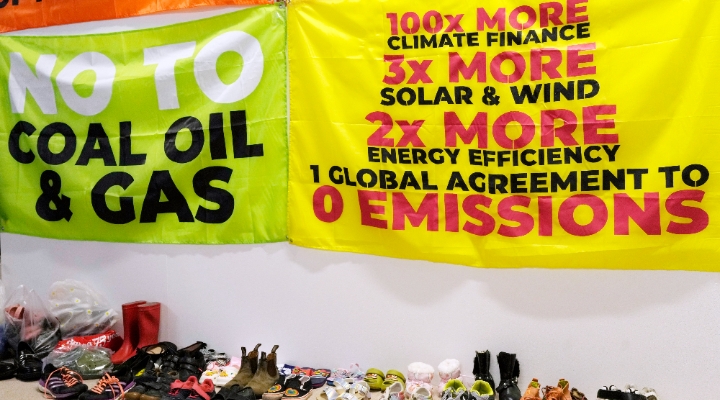
As COP28 negotiations complete their second day, we spoke to Michael John Lytle, chief executive of passive investor Tabula Investment Management. In the interview, he discusses investing passively with low risk while fighting to meet the Paris Agreement's 1.5° target.
Tabula, which focuses on fixed income and credit ETFs, launched four first-to-market Paris-aligned fixed income ETFs, the EUR IG Corporate Bond ETF [TABC] in January 2021, followed by EUR HY [THEP], Global HY Fallen Angels [THFA], and most recently the EUR Ultrashort IG Corp ETFs [TUCP].
For readers looking to invest in the fight against climate change, how does bond fund investing differ from active equity investing?
The standard explanation is that, with equities, you're an activist investor and you try to influence the direction of a company. You have shares and you get to vote every year, you can go to the meetings, you can be noisy, you can vote people down and vote for initiatives. In the bond world, none of that exists and you don't have any meetings. But you can have a lot of direct impact on the company by whether you fund it or not.
For fixed income, the idea is that you don't want to invest in people who aren't doing what you would like to see them do for the planet as a whole, and for themselves and their businesses. For the planet, because we want to drive towards Paris goals, the only way we see to do that is through companies that have created significantly smaller carbon footprints and we want to incentivise them to take over their industries. From a business perspective, we want to show that there are sanctions if you fail and we want to make sure that we're investing in companies that are sustainable in their underlying businesses – those companies will perform better with better credit spreads over time.
The Paris Agreement carries a lot of weight as a climate goal, but the guidelines have also been criticised. We're not exactly on track. How does that affect your strategies?
I don't think anybody criticises the guidelines they put in place, what they say is that people are not complying with it. For example, this year, the amount of greenhouse gas emissions is higher than it was last year.
When you build financial products, you separate yourself from these political issues. How do countries who have signed up to the Paris Agreement implement these guidelines from a geographic perspective, down through their corporate sectors? What control do they actually have over the political versus commercial interface?
We know the bond issuers in the main index, we know their carbon footprints, we have a lot of data around their behaviour, and a we have information around their alignment with various United Nations Sustainable Development Goals. And we can change the benchmark based on these control factors and select who we'll invest in and who we won't. It's pretty programmatic. These liquid Paris-aligned strategies are the only ways in which you can move billions, if not trillions, because they're designed in ways that they remain as liquid as the parent benchmarks.
You use indices specifically aligned with the Paris Agreement. Do you see other major indices doing that?
It's a tipping point issue. I think once you get past a certain amount of money moving into Paris Agreement-aligned benchmarks, and the intellectual and investment conviction among most major investors is that they want to be exposed to Paris-aligned strategies, then, you can go back and use corporate action to change the benchmarks that old funds are tracking.
But if you talked about this five years ago, there was almost no money tracking any form of ESG benchmark, or belief that we'd be here today. Crowd behaviour has led to hockey-stick growth in investing in ESG and Paris-aligned strategies over the last five years.
What that crossover point will be I can't tell you, but it will be a combination of money moved and a sense of urgency from investors that they can’t just drag their heels anymore on this. It can be frustrating. We're talking when it feels like we should be doing, but it takes a certain amount of talking and agreeing before everyone feels comfortable doing. But then when you finally do, there's an avalanche effect to the follow-through on it.
What are you expecting to see from COP this year?
It's a big question. Last year was the biodiversity COP. I expect a lot of energy and effort is going to go back into how far we are away from the Paris guidelines, how more carbon is going into the atmosphere every year. How are we supposed to be drawing down? And I think there'll be a lot of discussion of carbon capture and how you make it economically possible to change the big numbers.
One concern for people is that even when some countries are getting on board others aren't, allowing bad actors to keep going and creating too much carbon while somebody else is coming along to clean up. When you clean up after your kids, it incentivises them to just throw their stuff on the ground because when they come back to their room, it's always tidy. It's the same thing in the environmental space. If some good Samaritan comes along and cleans stuff up, spends trillions on capturing carbon, it allows other to behave badly.
I don't think we have the luxury of standing on principle. We're hitting tipping points to keep 1.5 alive – and most people have actually given up on 1.5, and keep talking about it as a way to pushing for change.
I think this year will be about reaffirming what the goals are, what is actually achievable, how we’re going to get there, and how we're going to accelerate and get on top of this, as opposed to keep coming back together every year and moaning about how we failed.
This interview has been edited for clarity and brevity







.jpg)




















